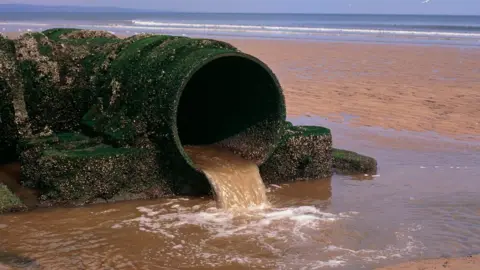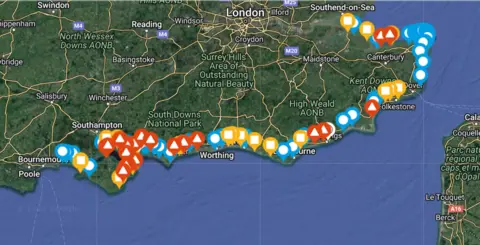South-east beaches 'hit by unprecedented sewage dumps'
 Science Photo Library
Science Photo LibraryNearly all designated coastal bathing areas in the south east have been put at risk by an "unprecedented" level of sewage discharges, an environmental campaign group has said.
SOS Whitstable said five months' worth of releases occurred in the Southern Water area in the first week of November.
It said the scale of the discharges was "not morally acceptable".
The firm said "unprecedented stormy weather" had overwhelmed drains.
 Southern Water
Southern WaterSOS Whitstable said it began to monitor data in summer 2021 from Southern Water's online Beachbuoy tool, which records sewage discharges.
Campaigner Ed Acteson said sewage was released 493 times in the first eight days of November 2022.
He said: "This is an absolutely unprecedented level of sewage pollution.
"Legally they are allowed to do this in exceptional circumstances but this is not morally acceptable."
Sewage was dumped in or near 83 bathing areas in Dorset, Hampshire, the Isle of Wight, Kent and Sussex, he said.
Only Westbrook Bay in Margate, St Margaret's Bay near Dover and Stoke Lake in Gosport had not had any discharges in November, he added.
Allow X content?
Southern Water said it accepted the campaign group's figures.
The firm's Chief Customer Officer, Katy Taylor, said: "We've experienced unprecedented stormy weather and flash flooding in early November, with more rain in the last week than we'd normally expect to see for the whole of the month.
"We are investing £2bn across five years - much of which will reduce the use of storm overflows, increase storage capacity and find ways to divert rain back to the environment naturally."
The firm said storm overflows are made up of up to 95% rainwater.
The Met Office said south-east England had experienced 89% of its average November rainfall so far this month.

Follow BBC South on Facebook, Twitter, or Instagram. Send your story ideas to [email protected].
